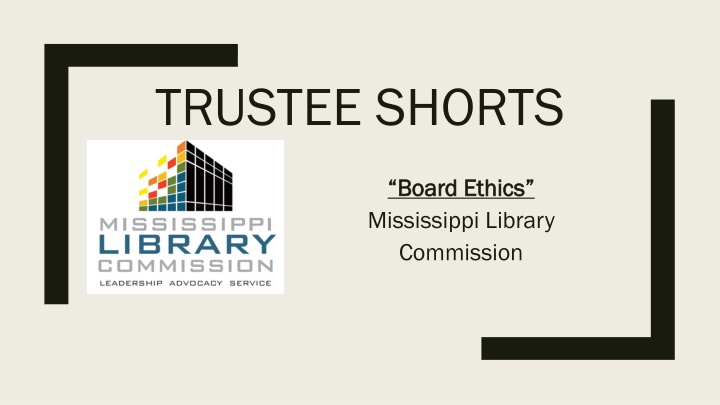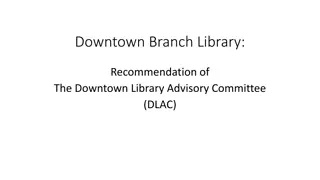Importance of Ethics in Library Governance
Ethics play a crucial role in guiding decision-making processes within library governance. A code of ethics serves as a written set of guidelines outlining the company's fundamental values and ethical standards for employees and management, ensuring actions align with ethical principles. Library trustees, as public servants, must uphold ethical values to represent the community effectively.
Download Presentation

Please find below an Image/Link to download the presentation.
The content on the website is provided AS IS for your information and personal use only. It may not be sold, licensed, or shared on other websites without obtaining consent from the author.If you encounter any issues during the download, it is possible that the publisher has removed the file from their server.
You are allowed to download the files provided on this website for personal or commercial use, subject to the condition that they are used lawfully. All files are the property of their respective owners.
The content on the website is provided AS IS for your information and personal use only. It may not be sold, licensed, or shared on other websites without obtaining consent from the author.
E N D
Presentation Transcript
TRUSTEE SHORTS Board Ethics Board Ethics Mississippi Library Commission
Why are Ethics important? Ethics provide the foundation and the framework for decision making. A CODE OF ETHICS is: A CODE OF ETHICS is: A written set of guidelines of the company's primary worths and ethical standards given from an organization to its workers and management to guide all involved in the company's business in their actions according to Black s Law Dictionary.
An Ethical Board Administrative library trustees are volunteers, but they are also public servants with a specific charge. They are to represent the public in all library matters. Most trustees do not come from a library background, so it is important that they receive pertinent information that allows them to represent all members of the community.
Library Ethics American Library Association Code of Ethics of the American Library Association, January 22, 2008 As members of the American Library Association, we recognize the importance of codifying and making known to the profession and to the general public the ethical principles that guide the work of librarians, other professionals providing information services, library trustees and library staffs. Ethical dilemmas occur when values are in conflict. The American Library Association Code of Ethics states the values to which we are committed, and embodies the ethical responsibilities of the profession in this changing information environment.
Code of Ethics of the American Library Association We significantly influence or control the selection, organization, preservation, and dissemination of information. In a political system grounded in an informed citizenry, we are members of a profession explicitly committed to intellectual freedom and the freedom of access to information. We have a special obligation to ensure the free flow of information and ideas to present and future generations. The principles of this Code are expressed in broad statements to guide ethical decision making. These statements provide a framework; they cannot and do not dictate conduct to cover particular situations.
Code of Ethics of the American Library Association We provide the highest level of service to all library users through appropriate and usefully organized resources; equitable service policies; equitable access; and accurate, unbiased, and courteous responses to all requests. We uphold the principles of intellectual freedom and resist all efforts to censor library resources. We protect each library user's right to privacy and confidentiality with respect to information sought or received and resources consulted, borrowed, acquired or transmitted. We respect intellectual property rights and advocate balance between the interests of information users and rights holders.
Code of Ethics of the American Library Association We treat co-workers and other colleagues with respect, fairness, and good faith, and advocate conditions of employment that safeguard the rights and welfare of all employees of our institutions. We do not advance private interests at the expense of library users, colleagues, or our employing institutions. We distinguish between our personal convictions and professional duties and do not allow our personal beliefs to interfere with fair representation of the aims of our institutions or the provision of access to their information resources. We strive for excellence in the profession by maintaining and enhancing our own knowledge and skills, by encouraging the professional development of co-workers, and by fostering the aspirations of potential members of the profession.
Library Ethics United for Libraries Public Library Trustee Ethics Statement, January 2012 Public library Trustees are accountable for the resources of the library as well as to see that the library provides the best possible service to its community. Every Trustee makes a personal commitment to contribute the time and energy to faithfully carry out his/her duties and responsibilities effectively and with absolute truth, honor and integrity.
Public Library Trustee Ethics Statement Trustees shall respect the opinions of their colleagues and not be critical or disrespectful when they disagree or oppose a viewpoint different than their own. Trustees shall comply with all the laws, rules and regulations that apply to them and to their library. Trustees, in fulfilling their responsibilities, shall not be swayed by partisan interests, public pressure or fear of criticism. Trustees shall not engage in discrimination of any kind and shall uphold library patrons rights to privacy in the use of library resources.
Public Library Trustee Ethics Statement Trustees must distinguish clearly in their actions and statements between their personal philosophies and attitudes and those of the library, acknowledging and supporting the formal position of the Board even if they disagree. Trustees must respect the confidential nature of library business and not disclose such information to anyone. Trustees must also be aware of and in compliance with Freedom of Information laws Trustees must avoid situations in which personal interests might be served or financial benefits gained as a result of their position or access to privileged library information, for either themselves or others.
Public Library Trustee Ethics Statement A Trustee shall immediately disqualify him/herself whenever the appearance of or a conflict of interest exists. Trustees shall not use their position to gain unwarranted privileges or advantages for themselves or others from the library or from those who do business with the library. Trustees shall not interfere with the management responsibilities of the director or the supervision of library staff. Trustees shall support the efforts of librarians in resisting censorship of library materials by groups or individuals.
Conflict of Interest The Legislature declares that elective and public office and employment is a public trust and any effort to realize personal gain through official conduct, other than as provided by law, or as a natural consequence of the employment or position, is a violation of that trust. Therefore, public servants shall endeavor to pursue a course of conduct which will not raise suspicion among the public that they are likely to be engaged in acts that are in violation of this trust and which will not reflect unfavorably upon the state and local governments. Mississippi Code 25-4-101
An Ethical Board Plays by the Rules Mississippi Ethics Commission Authority derived from 109, Mississippi Constitution of 1890, and 25-4-105 Mississippi Code The by-laws as required by 39-3-17 Mississippi Code
Questions and Formal Training for Trustees? Mississippi Library Commission 1-800-647-7542 Contact Mac Buntin at the Mississippi Library Commission kbuntin@mlc.lib.ms.us 601-432-4035























